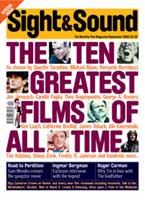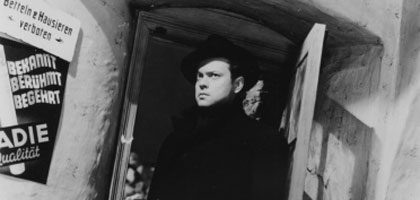
Nul Britannia

It's stiff upper lips all round as British films fail in the Critics' Poll. Nick James wonders whether realism has ruined their chances
Why should anyone care if British films, as opposed to, say, German or Iranian films, do badly in all-time best-film polls? After all, we've tried to make these polls as outward-looking as we can. And yet our electorate's inevitable anglophone weighting renders the spotty showing of British movies an interesting agony. Other parts of Europe still hold their own against the Hollywood hegemony, it seems, but little 'properly' British work is highly regarded by critics (I say properly to discount Kubrick's films, which, though made in the UK, were always Hollywood-studio financed).
Reasons for this poor rating are easy to find. You can start with François Truffaut's prejudice that British cinema is an incompatability of terms, or you can blame the stiff competition for British talent from better career-building options such as Hollywood, the theatre or British television. These are plausible, if specially pleaded, contingencies.
Or you could argue that Britain's critical favourites Powell and Pressburger made too many great films that split their vote. But when you add up the Critics' Poll scores for A Matter of Life and Death (3), A Canterbury Tale (3) and Black Narcissus (4) - the three P&P movies that more than one contributor voted for - you get a total of ten, which would place a P&P composite at equal eighteenth alongside Welles' Touch of Evil, with still less than a quarter of the vote for Welles' Citizen Kane. And if you take the Powell and Pressburgers out, you'll find only the highest-placed British film, Carol Reed's The Third Man (6), and two of David Lean's, Lawrence of Arabia (5) and Brief Encounter (3), among the films with more than two votes. The fact is that all the votes for all the British films with more than one vote add up to just 32, leaving them way short of Kane and demonstrating that Welles alone gets more votes than all the British films put together.
How about that for a goad to nationalists: one American director is worth more than all the British movies ever made! Coincidentally, only ten 'properly' British films garner more than one vote, creating another Sight & Sound list. It runs: 1 The Third Man; 2 Lawrence of Arabia; 3 Black Narcissus; =4 Brief Encounter, A Canterbury Tale, A Matter of Life and Death; =7 The Lady Vanishes (Hitchcock), Orlando (Sally Potter), Performance (Nic Roeg), Topsy-Turvy (Mike Leigh). Compare this to the top ten of the bfi's 100 British Films as voted for by the great and the good of the British film industry in 1999: 1 The Third Man; 2 Brief Encounter; 3 Lawrence of Arabia; 4 The 39 Steps (Hitchcock); 5 Great Expectations (Lean); 6 Kind Hearts and Coronets (Robert Hamer); 7 Kes (Ken Loach); 8 Don't Look Now (Roeg); 9 The Red Shoes (Powell and Pressburger); 10 Trainspotting (Danny Boyle).
What's most striking about both these lists is the poor showing for British realism. Ever since the documentary-film movement of John Grierson came to dominate British film thinking in the 1930s, it has been widely assumed that realism is what the British do best - it's what news pundits tend to expect from British cinema and what television drama commissioners have routinely promoted. With the standout exceptions of Brief Encounter and Kes, these polls suggest otherwise. They reflect the general shift in cinema tastes towards spectacle and away from the reflection of ordinary life. Even Mike Leigh's most succesful film here is his paean to High Victorian fantasists Gilbert and Sullivan.
What comfort then, if any, can British film-makers draw from this poor rating? Both British top tens do at least recognise the value of more recent films than those featured in the main top tens. Orlando, Topsy-Turvy and Trainspotting were made in recent times of relative financial difficulty and their flights of fancy are all well realised within tightish budgets. The alternative to such restrictions remains, of course, Hollywood, where the likes of Chaplin, Hitchcock and Ridley Scott achieved their best work. They too fall naturally into the camp of fantasists and dreamers, for all Scott's recent protestations over Black Hawk Down that real-life stories can't be bettered.
It's not that the British film industry hasn't been trying to replicate the success of its putative 'best' films. The Third Man and Lawrence of Arabia are war-based tales of subterfuge and derring-do. A string of such subjects has been tried since the Oscar success of The English Patient (1996), but the scale of imagination in the Reed and the Lean far outstrips the palely imitative likes of Enigma and Charlotte Gray. And these war films are still rooted in a class-ridden vision of Britain that remains an obstacle to making a truly universal cinema.
All the comfort the British may be left with, then, is that the world's second-favourite director, Alfred Hitchcock, learned his trade in his homeland. But had Hitchcock's Vertigo been shot similarly but set in Liverpool (with a fatal trip to a clifftop chapel) and starred, say, Alec Guinness as Scottie and Vivien Leigh as Madeleine, would it still be regarded as the second-greatest film ever made? Somehow, for all Hitchcock's imaginative talent, all of the above - and maybe something to do with scale and quality of light - make me doubt it.
